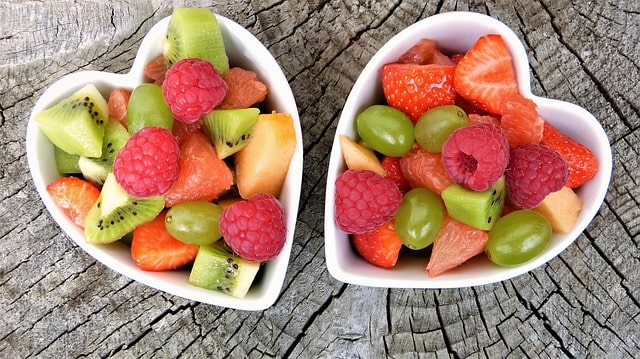 Many women experience uncomfortable symptoms during periods. They may include symptoms like cramps, headaches, nausea, fatigue, bloating, mood swings, or diarrhea.
Many women experience uncomfortable symptoms during periods. They may include symptoms like cramps, headaches, nausea, fatigue, bloating, mood swings, or diarrhea.
One of the best ways to control these issues, related to the periods and associated hormonal swings, is through dietary changes. Some foods can, indeed be helpful. At the same time, certain foods can make periods heavy and prolonged.
Fruits have an important place in women’s diet. They are natural ready-made snacks containing vitamins, fiber, and other nutrients.
There is a wide range of fruits, and due to their diversity, they can help women improve their condition during periods in many ways.
For example, some fruits are water-rich and are great for staying hydrated. Sweet fruits are beneficial when you want to have dessert but wish to reduce refined sugars consumption.
Here are some of the fruits to include in your daily diet when having periods.
Bananas
Bananas contain large amounts of magnesium, potassium, and fiber. These compounds may help with irregular bowel movement.
They are also suitable for improving mood, having a calming effect. Besides, magnesium is an excellent muscle relaxant, and the fruit may ease cramps [1].
Oranges
Oranges contain calcium and vitamin D that improve mood, increase energy, ease anxiety, and depression. Also, oranges are a great fruit to eat to alleviate cramps and aches.
Oranges are rich in fiber, and they are effective against digestive disorders. Due to a high amount of slow absorbing carbs, oranges may be a good snack and fit to substitute sweets.
Watermelon
Watermelon is a great option to regulate digesting disorders. It helps significantly if you feel bloated. To prevent unpleasant symptoms, it is recommended to eat watermelon some days before the periods.
Also, watermelon helps keep the body hydrated as it mainly contains water. Besides, some studies found watermelon may improve your mood, and it is effective against cramps.
Figs and plums
These fruits contain a large amount of natural sugars, and they can easily compensate the losses your body undergoes during the periods[2]. These fruits are also helpful against bloating.
Lemons
Lemons as all the citruses are rich in fiber and various vitamins. They are effective against mood swings[3] and reduce bloating. Lemons are useful if you feel fatigued or nausea during periods.
Pineapple
Pineapple contains bromelain – specific enzyme. It is very effective against inflammation. Also, bromelain is helpful when you have light periods and want to regulate them or make heavier[4].
Kiwi
Kiwi contains a large amounts of vitamin C and zinc. These compounds help with iron absorption, which is very important during periods. Also, kiwi can increase energy and improve mood.
Because of actinidin, an enzyme, the fruit helps with bloating and digesting protein-rich meals. Kiwi fiber helps improve bowel movements.
Dragon fruit
Dragon fruit is rich in fiber and contributes to improving digestion. Some studies found that dragon fruit contains prebiotics that promotes the growth of healthy bacteria: lactic acid bacteria and bifidobacteria. Because of it, the fruit may improve the balance of good bacteria in your gut.
Also, dragon fruit contains iron that plays a significant role in transporting oxygen throughout the body. To fight low iron levels, that can occur during periods; it is good to add dragon fruit into your diet.
Vitamin C and other phytochemicals in the fruit promote iron absorption.
Passion fruit
Passion fruit contains lots of iron, and it is recommended to consume when a woman faces hemoglobin deficiency, a condition called anemia.
Anemia can happen during heavy periods, and sometimes, it can lead to severe problems. Usually, the symptoms of anemia include chronic fatigue, blackouts, dizziness, and breathlessness.
Also, passion fruit is rich in dietary fiber that makes it beneficial for digestion and improves bowel movement. The high water content of the fruit helps to overcome dehydration.
Passion fruit is also rich in alkaloids, that can help overcome various discomforts related to periods. They are well-known phytonutrients with sedative properties. That is why you can take passion fruit to enhance mood, treat depression, anxiety, and sleeping disorders[3].
Papaya fruit
Papaya fruit contains useful digestive enzymes that help with gastrointestinal disorders. Because of low mood, depression, and other psychological issues, women may engage in binge eating during periods[5], may resort to eating more junk food too.
The digestive enzymes of papaya help digest these meals and prevent nausea or bloating.
Another enzyme of papaya fruit called papain is helpful to ease menstrual pain and regulate flow[1]. Few servings of raw papaya may help stimulate estrogen production, and it can be helpful against irregular periods.
Butter fruit
Butter fruit or avocado is also beneficial to women experiencing discomfort due to periods. The fruit helps in many ways.
Firstly, it contains vitamin D3 that is a natural painkiller and may help stop severe pain and cramps[1]. Secondly, butter fruit is rich in potassium that helps against bloating and combats muscle pain.
Moreover, butter fruit contains healthy fat, magnesium, and dietary fiber that contribute to balancing women’s hormones. Half of the avocado on toast or in the salad will help you ease symptoms caused by disruption of hormonal functions.
Guava fruit
Some pieces of evidence found that guava fruit may help ease stomach cramps during periods. Few studies indicate that guava leaf extract is also beneficial as a painkiller, and if you use it, the pain intensity may come down.
Also, women should know that some fruits may not be so good to eat during the periods. Read the tips attentively to know what fruits to avoid or eat in small amounts to prevent some unpleasant symptoms.
Mango
Mango is a favorite fruit of many ladies, but some studies say overeating mangoes during periods can cause distress. Mango contains a more substantial amount of dietary fiber than any other fruit, and it can cause diarrhea.
Also, some varieties of mango increase the heat in the body and therefore may cause heavy periods.
Pineapple
Pineapple is another fruit that is not recommended for those with heavy periods.
Lemons
Despite the positive effects of lemons, be careful, especially if you have stomach diseases caused by inflammation (like gastritis) as it can cause severe stomach irritation.
Besides we want to add some rules, you must consider while eating fruits during periods. They include:
- Do not eat the fruit, if you are allergic or have sensitivities, as hormonal changes during periods may trigger specific reactions.
- Do not add fruits to milkshakes or yogurts. It can provoke some digestive issues or diarrhea[6]. Treat yourself with plain fruits.
- Do not eat fruits in excessive amounts as you may suffer from bloating.
- Try not to add sugar to the fruits even when they are a bit sour. Sugar has inflammatory properties and may increase cramps[1].
Thus, when it comes to menstruation, it is a good idea to look at the foods you eat. It is the simplest and natural way to avoid unpleasant symptoms.
References
- Najafi N, Khalkhali H, Moghaddam Tabrizi F, Zarrin R. Major dietary patterns in relation to menstrual pain: A nested case control study. BMC Womens Health. 2018;18. doi:10.1186/s12905-018-0558-4
- Tomelleri R, Grunewald KK. Menstrual cycle and food cravings in young college women. J Am Diet Assoc. 1987;87(3):311-315.
- W. Freeman E. Treatment of depression associated with the menstrual cycle: Premenstrual dysphoria, postpartum depression, and the perimenopause. Dialogues Clin Neurosci. 2002;4(2):177-191.
- Pavan R, Jain S, Shraddha, Kumar A. Properties and Therapeutic Application of Bromelain: A Review. Biotechnol Res Int. 2012;2012. doi:10.1155/2012/976203
- Chung S-C, Bond EF, Jarrett ME. Food Intake Changes Across the Menstrual Cycle in Taiwanese Women. Biol Res Nurs. 2010;12(1):37-46. doi:10.1177/1099800410364554
- Darabi F, Rasaie N, Jafarirad S. The Relationship Between Premenstrual Syndrome and Food Patterns in University Student Girls. Jentashapir J Health Res. 2014;5(6). doi:10.5812/jjhr.26656




 Dr. Preet Pal SB is a physician (M.D. Medicine) with a specialization in diabetes (Fellowship in diabetes, Royal Liverpool Academy). He has a particular interest in metabolic disorders, considering that they are rising in every corner of the world, more so in India.
Dr. Preet Pal SB is a physician (M.D. Medicine) with a specialization in diabetes (Fellowship in diabetes, Royal Liverpool Academy). He has a particular interest in metabolic disorders, considering that they are rising in every corner of the world, more so in India.